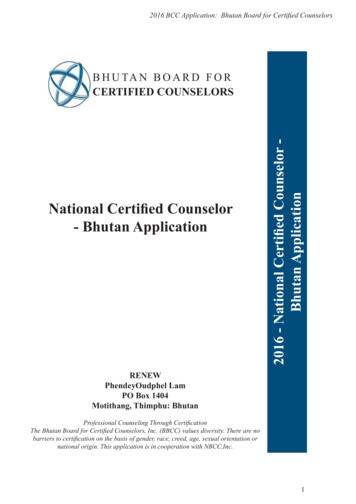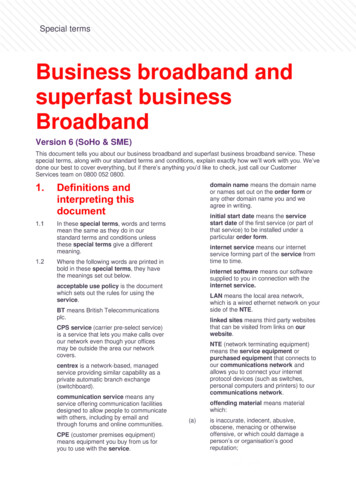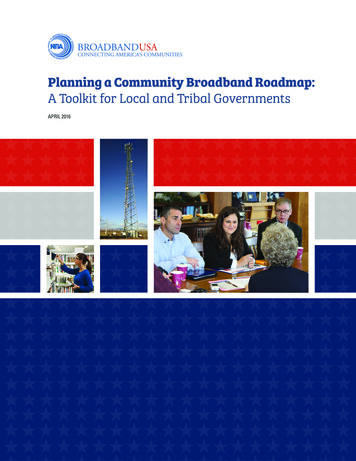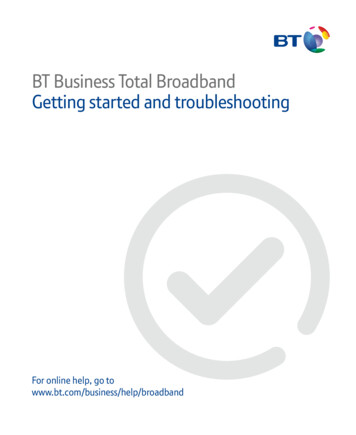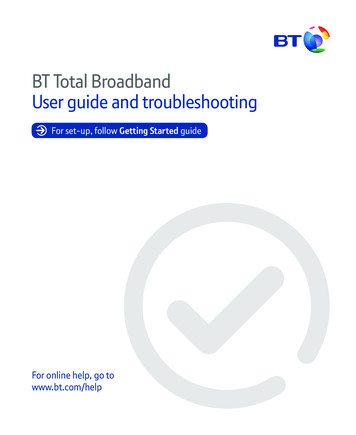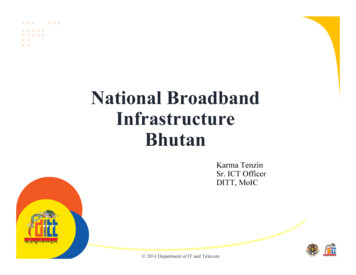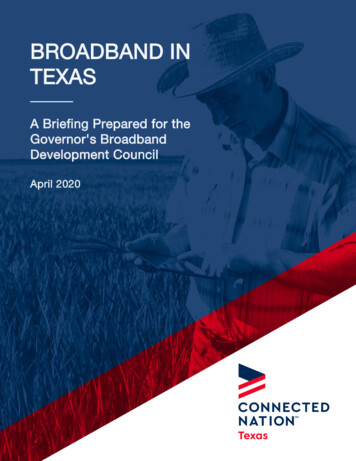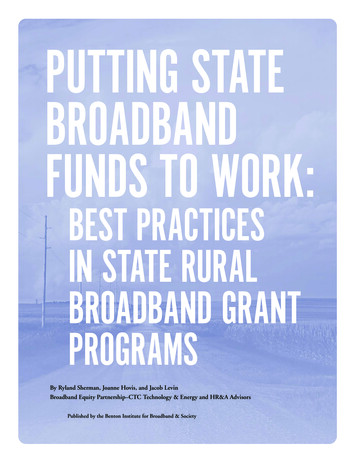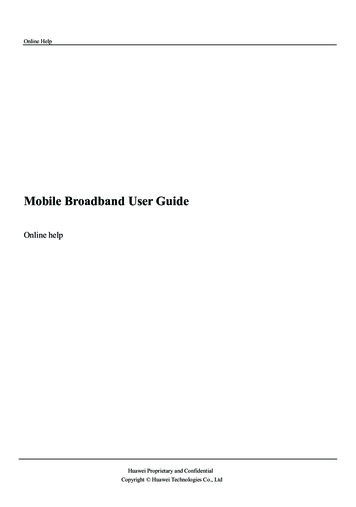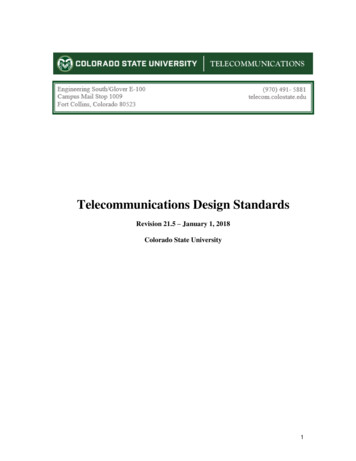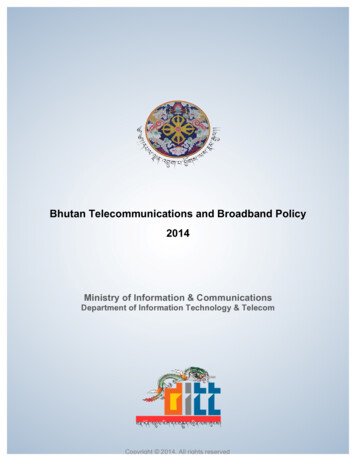
Transcription
Bhutan Telecommunications and Broadband Policy2014Ministry of Information & CommunicationsDepartment of Information Technology & TelecomCopyright 2014, All rights reserved
Glossary of TermsAs used in this Policy and associated Strategic Plan of Action, the following terms have themeanings shown:TermsDefinitionsAuthorityBhutan InfoComm and Media AuthorityBPCBhutan Power CorporationBroadbandRefers to high speed communications access servicesBTBhutan TelecomGovernmentRefers to the Government of the Kingdom of BhutanICTInformation and Communications TechnologyMinistryMinistry of Information and CommunicationsRNRRenewable Natural ResourcesISPInternet Service ProviderIDDInternational Direct DiallingITInformation TechnologyUSFUniversal Service FundFDIForeign Direct InvestmentTVTelevisionVOIPVoice over Internet ProtocolFBOFacility Based OperatorSBOService Based OperatorMVNOMobile Virtual Network OperatorMSOMultiple System OperatorQoSQuality of Servicei""
ITUInternational Telecommunication UnionROWRight of WayIPv6Internet Protocol Version 6ii""
Table of ContentsGlossary"of"Terms"."i"1." Introduction"."1"2." Background"."2"3." ng"Document"."3"4." nciples"."3"5." s"."4"1." Objectives"."4"2." "7"B."Broadband"."8"iii""
1." 9""iv""
1. IntroductionThe Royal Government of Bhutan (RGoB) recognises Telecommunications and Broadband asimportant contributors to the socioeconomic development of the country. They have a vital roleto play in enhancing competitiveness, increasing productivity and economic development, andpromoting greater social inclusion to mention a few. Telecommunications and Broadband are thefoundation on which “An ICT enabled, Knowledge-Based Society as a Foundation for GrossNational Happiness”1will be built.Increasing and widespread use of Mobile and Internet services coupled with technologicalconvergence has necessitated the need for a consolidated Telecommunications and Broadbandpolicy. Bhutan has witnessed impressive progress in ICT in the last decade. The Bhutan ICTPolicy and Strategy (BIPS) 2009, which has guided the development of the sector is foundinsufficient moving forward especially in the areas of Telecommunications and Broadband giventhe fast changing nature of the sector. Therefore, a policy on Telecommunications andBroadband is required. The Bhutan Telecommunications and Broadband Policy 2014 will guideand shape the development of telecommunications and broadband sector in the country in thecoming years.It provides guidelines, principles and rationale on how to go about developing andpromoting the sector. The main objectives of the policy are: connectivity for all, strengthening ofrules and regulations, creation of conducive environment for private investments and competitionleading towards an efficient market and affordable broadband and telecom services.The development of broadband infrastructure and broadband services are at the forefront of anytelecommunications policy. However, given that broadband must develop on the bedrock oftelecommunications and also given that the issues confronting them are intertwined RGoB hasissued a converged Telecommunications and Broadband Policy. Therefore this policy includeselements from both, either integrated or differentiated as relevant. From the perspective of RGoBand the stakeholders, the policy must be considered as """""""""""""""""Ida International, 21st October, 2012, Bhutan ICT Roadmap1""
2. BackgroundBhutan has come a long way since 1963, when the first works for building aTelecommunications network was initiated as part of the first five year plan for moderneconomic development of the country. Bhutan Telecom, the first fully state owned Telecomoperator came into existence on 1st July 2000 with the corporatisation of the erstwhileDepartment of Telecommunications which was established in 1970. On June 2nd 1999, Internetand Television services were launched as part of Silver Jubilee Celebration of the reign of HisMajesty, King Jigme Singye Wangchuck, the Fourth Druk Gyalpo.In 2003, Bhutan Telecom launched the first mobile communication service in the country. Sincethen, Bhutan's development in the sector has been phenomenal. In 2008, Tashi InfoCommLimited, a private Telecom operator started its operation. Today, between the two operators,mobile sector has achieved up to 76.6% penetration. There are four licensed ISPs (InternetService Providers) currently serving internet and hosting facilities. Between leased lines, fixedbroadband, 3G, GPRS/EDGE and dial up, the country has achieved sizable access of internet tothe population with a take up of 40.9%.Recognizing the importance as well as the capital intensive nature of a contemporary high speedbackbone network in the country, the Government took on itself to establish fibre opticinfrastructure throughout the country. In partnership with BPC, the MoIC has rolled out fibresthroughout the country on power transmission and distribution infrastructure. So far fibre opticcables have reached 20 districts and 187 gewogs. The fibres have been leased to the telecomoperators for free to keep the price of services low. Bhutan Telecom and Tashi InfoComm arealready providing services using this infrastructure.In terms of international competitiveness, in 2012 (the date of the most recent index), the ITUranked Bhutan 1182 out of a total of 157 countries in terms of ICT development. From a regionalperspective, Bhutan ranks 22 out of 28 countries of the Asia and the Pacific region. Theserankings suggest that Bhutan although climbing up from previous rankings has much to do togain from the benefits of ICT in general, and broadband in particular, compared to othercountries regionally and """"""""""""""""""""""""""""ITU, Measuring Information Society, 2013.2""
3. Telecommunications and Broadband Policy – A Living DocumentTelecommunications and Broadband development is occurring in a dynamic social, market andtechnological context. The opportunities, needs and solutions are changing rapidly. BhutanTelecommunications and Broadband Policy needs to be flexible and adaptive to reflect the paceof change and ensure that the best outcomes are delivered to the Bhutanese society at any pointin time. This policy is a living document, and will be reviewed and revised regularly to ensuremaximum currency and effectiveness.4. Bhutan Telecommunications and Broadband Policy Principles"The objectives set out in this policy seek to ensure maximum benefit to Bhutan as a whole,supplementing other efforts to promote national welfare. The following principles will guide thedevelopment of Telecommunications and Broadband sector:Market driven: Telecommunications and broadband infrastructure provision and servicedelivery will be achieved through the operation of market forces. The government will support inestablishing backbone infrastructure and rolling out services to areas which are not commerciallyviable.Universal access: Telephony and broadband services shall be made accessible to all Bhutanese.All dimensions of access including availability, affordability and capacity to use shall beaddressed.Affordability: The Government shall ensure that telephony and broadband services at entrylevels shall be made affordable for all people in Bhutan.Leadership: Leadership in telecommunications and broadband usage at all levels of society,especially by the private sector shall be promoted. The Government will lead by transforming itsown processes and public sector services.5. Scope and Practical FocusThis policy provides an over-arching framework for programs in the 11th Five Year Plan andbeyond. The policy is a major component of overall national ICT Policy.Practical focus, with emphasis on specific targets and measurable deliverables, is provided inStrategic Action Plan under part D.3""
A. Telecommunications1. ObjectivesThe objectives of the Telecom Policy are to: Ensure development of Bhutan’s Telecommunications Sector in line with internationaltrends and that people of Bhutan are able to enjoy quality ICT services. Ensure that Telecommunications sector provides a strong foundation for Bhutan’s ICTenabled Knowledge based Society, and a true engine for its socio-economic progress. Guide and facilitate evolution of the sector to attain its full potential. Ensure that a conducive environment for infrastructure, regulations, private sectorparticipation and government support is promoted. Promote innovations in the sector. Promote green Telecommunications and ensure environmental responsibility.2. Policy Elements2.1 Universal Access For the purpose of Universal Access, Telephony and entry level Broadband are defined as basicservices. The government will ensure that access to these services is available to village level.In areas where service provision is not economically viable, government will take recourse toUniversal Service Fund.2.2 Universal Service Fund (USF) "Universal Service Fund has been very effective in improving access to basic telephony andmobile services in the country. The government will continue with the system.USF fund will comprise of license fees and a percentage of annual gross revenue collected fromoperators.2.3 Green Telecom "Telecommunications sector will be developed in line with RGoB’s environment policy.Measures will be taken to ensure those telecommunication infrastructures are not established in a4""
way that degrades the environment and effects biodiversity of the country. The number of suchstructures shall be minimized through infrastructure sharing. The government shall promote theuse of clean and energy efficient technologies. It will also ensure effective e-waste management.2.4 Licensing Framework "The Government shall adopt a converged and technology neutral licensing framework toencourage innovation, diversity and competition leading to affordability, choice and quality ofservices.2.5 Competition Framework "The Government shall promote a vibrant and competitive Telecommunications market. To thisend, a conducive regulatory environment that will promote private investments including publicprivate partnership and curb anti-competitive behaviour will be established.2.6 Mobile Development "Given the growing significance of the sector as an enabler of economic development and socialcohesion, the government will initiate steps to make value added services affordable andaccessible to all businesses and citizens. When the existing exclusivity expires after 2013, themarket may be opened up based on sound proposals and market trends. Priorities shall be givento 100% local bidders through a selective selection process. "2.7 Quality of Service (QoS) "The Government shall ensure quality of service by requiring service providers to provide qualityof service guarantee to consumers following International standards and best practices.A System shall also be put in place for ensuring health, quality and maximum uptime for thenational fiber network."2.8 Consumer Protection "Service providers shall be required to provide service level agreements (SLAs) for all theirservices. In addition, consumers shall be protected under the prevailing Consumer Protectionlaw. The Government will carry out consumer protection awareness and issue regulations to thiseffect.2.9 Security and Privacy "5""
The Government shall ensure availability, confidentiality and integrity of Telecommunicationsnetwork and Information flow. It shall also protect privacy of consumers. The government willrequire Telecom operators to adhere to the highest standards of safety and security.2.10 Spectrum Management "Since spectrum is a limited and valuable resource, the government will ensure prudent andoptimal utilization to spread ICT services throughout the country. The government shall reviewspectrum utilization on a regular basis and device measures for efficient utilization.2.11 Consolidation of Fiber Assets Providing access to affordable and reliable communication facilities to the citizens of Bhutan andestablishing the National ICT Backbone is a national priority. The government havingappreciated the small size of the broadband and telecom market in Bhutan has initiated theNational Broadband Masterplan Project to roll out fibers to all the twenty (20) Dzongkhags andtwo hundred and five (205) gewogs to bring fast and reliable services to the people. Further, thepremise for the government in establishing fibers till the gewog level is also based on the factthat investment in the fibers cannot be commercially viable for any operator in the country atpresent. Therefore, the consolidation of all existing fibers had been carried out from thisperspective.Further to reduce the cost of connectivity, no depreciation and O&M cost shall be loaded to thelease rent until such time cost recovery becomes feasible. The intent of the government here is toensure a level playing field for all operators and to help improve competition at the service level.To make this infrastructure available to the industry in a fair and sustainable way, thegovernment shall come up with a framework for “Leasing Fibers” detailed in section D of thisdocument.2.12 Infrastructure Sharing and Right of Way The government will make available all infrastructures belonging to it and its corporations forestablishing telecommunications infrastructure. It will also facilitate faster Right of Way (ROW)approval. 2.13 Disaster Communication "The Government shall leverage Telecom and ICT infrastructure to prevent, mitigate and managedisasters. It shall work with relevant players to establish a robust communication system for useduring disaster. Telecom operators shall be mandated to follow International standards and bestpractices for contingency planning.2.14 Emerging Trends "6""
The Government shall ensure that Telecommunications sector keeps itself abreast with globaldevelopments and trends. "2.15 Regulatory Framework "A regulatory framework to enable and guide development of the sector in an efficient andeffective manner shall be adopted. Regulations shall promote innovation, competition, customerservices, fair play and environmental responsibility."2.16 Institutional Setup "Given the criticality of the sector a strong agency to guide and promote the development of thesector is necessary. A Telecom Division shall be established under DITT at the earliest. Thedivision will be upgraded to a department under MOIC in due course."2.17 Skills and Capacity Development "The Government shall ensure proper skills development across the sector. It will put in place aHuman Resource Development plan to help the sector to grow. Collaboration with academicinstitutions to bridge the gap between academic curriculum and what is required in the field shallbe carried out.7""
B. Broadband3"1. Definition of Broadband in Bhutan4For the purpose of this Policy, entry level broadband will mean a minimum download speed of512 kilobits per second (kbps). The Government in consultation with relevant stakeholders willamend the definition from time to time to arrive at ITU Broadband Commission’s definition."2. Objectives The objectives of the Broadband Policy are:3 To contribute towards well being and health of the people by provisioning of broadbandenhanced health services. To contribute towards increased economic welfare of Bhutan and its people by creatingsustainable employment opportunities and making Bhutan more attractive for businessinvestments and tourism. To promote social development and cohesion through broadband and conserve Bhutan'sculture and tradition. To enhance Public and Private Sector Efficiency and Performance through use ofBroadband. To enhance education and training through Broadband. To harness on benefits of mobile broadband for increased innovation and opportunityespecially in taking public services to the people. To promote development and access of local content via broadband. To enhance Global Integration and International Relations by enabling connection ofBhutanese businesses and communities with the wider """""""""""""""""Broadband is the name given to always on, high speed access services that provide connection to the internet andto other information services. A range of definitions are possible as discussed in Chapter 2 of the ITU’s BroadbandCommission report, Broadband: A Platform for Progress (May, 2011). However the recommended workingdefinition at page 19 of that report is the approach adopted in this Policy, namely: “The Broadband Commissionsought to focus on considering some of the core concepts of broadband as an always-on service (not needing tomake a new connection to a server each time a user wants to go online), and high-capacity: able to carry lots of dataper second, rather than the particular arrival speed of the s/Report 2.pdf)4While Broadband refers to the connection, it is to be treated as an ecosystem; firstly of infrastructure that needs tobe put in place, and then of services and application that can be accessed over this connection. This needs to be inline with Awareness among the people on Broadband usage and the trust in such an environment; the Accessibilityof such services and infrastructures and; Affordability of such facility so that the people may make use and benefitfrom it.8""
3. Short to Medium Term Goals for National Broadband Policy "3.1 To achieve critical mass of broadband service uptake during 11th FYP: The Governmentwill work with the private sector to achieve this.3.2 To have in place a competitive structure for the provision of broadband in Bhutan: TheGovernment will examine and remove legal and regulatory barriers to competition. It will ensurethat market for broadband services operates competitively.3.3 To achieve broadband service availability to 80% of both urban and rural communitiesduring the 11th Five Year Plan: 80% of people of Bhutan shall have accessibility to entry levelbroadband services or better. USF will be used in areas that are not economically viable.3.4 To ensure affordability of entry level Broadband: The Government along with relevantstakeholders shall ensure that an entry level broadband service is available to all at an affordableprice.3.5 To support all academic institutions to have access to Broadband: 100% of all academicinstitutions in Bhutan shall have broadband access.3.6 Government to lead the broadband evolution by delivering its services online overbroadband: A significant programme of e-Government transactions that can be performedonline and enhanced by broadband shall be developed and progressively implemented during thecourse of the 11th Five Year Plan.3.7 Lead Government applications: In addition to above, Government shall develop a range oflead applications for delivery of new, enhanced or extended services online using broadband. """""9""
C. Implementation responsibilities"1. Ministry of Information and Communications "The Ministry of Information and Communications will be responsible for ensuringimplementation of the Policy. It will carry out overall implementation, monitoring and review ofthe Policy and related Plan, working through the Committee as appropriate. Annual report onstatus of implementation will be submitted to the e-Gov Executive committee. "2. Telecommunications and Broadband Committee "The e-Gov Executive committee under e-Gov Governance Structure will also serve as theTelecommunications and Broadband Committee which will steer the implementation of thispolicy and oversee the development of the sector. Additional members from Telecom operators,ISPs and BICMA shall be included.The role of the Committee will be to ensure that the Telecommunications and Broadband Policyand the Strategic Action Plan are implemented and to ensure accountability on the part of theMinistries, Departments and Agencies responsible for each action or program item under part D.""""""""""10""
D. Framework for Leasing Fibers"During the 10 FYP, the government had undertaken the National Broadband Master PlanImplementation Project (NBMIP) to build a nation-wide fiber optic infrastructure for thecountry. Under the project, Optical Ground Wire (OPGW) and All Di-electric Self Supporting(ADSS) fibers have been rolled out in all twenty (20) Dzongkhags and one hundred and eightyseven (187) Gewogs. Additionally the government has consolidated all existing OPGWbelonging to Bhutan Telecom and Bhutan Power Corporation for which they have received faircompensation."Since fibers are limited, using them in a sustainable way to reach maximum population and to providequality service is a key policy objective. Therefore dark fibers shall be made available to licensedtelecom operators/ISPs currently in operation, fulfilling the conditions detailed below:a. A Lessee shall take managed services to all twenty (20) Dzongkhags using thefiber infrastructure within a reasonable timeframe. This is to ensure a levelplaying field for all service providers and to fair competition.b. Only one pair of dark fiber along any physical route shall be allocated to onelicensee. Allocations shall be made based on formal requests made by theLessee to the government.c. A Lessee shall not assign or sublet any fibers in part or in their entirety to anyother entity. Lessees are however permitted to lease managed services.d. The applicable tariff lease of the dark fiber pairs shall be according to therevised BICMA Telecommunications Tariff Order, 2009 and amendmentsthereof. The tariff applicable to a Lessee for a pair of fiber/Km per annum tothe Government shall be zero until otherwise notified.e. The RGoB reserves the right to revise the tariff in future if deemedappropriate.f. Dark fibers shall not be allocated to any Cable Operators or MSO at this time.They may however lease the bandwidth from any ISP.11""
E. Strategic Action Plan"Item1GoalDescription and targetResponsibleCompetition andInvestment: Establish alight touch regulatoryframework to promotecompetition in themarket1.1 Examine ways in which availability andaffordability of broadband can beenhanced through the removal of anyunnecessary regulatory constraints andfinancial imposts, together with redesign of schemes to encourageinvestment in broadband delivery.Specifically, and without limiting thegenerality of this item, examine theprospect of creative removal ofregulatory burdens and administrationfrom operators including the detailedapproval of retail tariffs for allbroadband service options.Ministry, inconjunction withAuthority andother stakeholders1.2Facilitate Local Loop unbundlingMinistry inconjunction withAuthority1.3 Review existing regulations pertainingto competitionAuthority1.4Establish a system for faster approval ofRight of WayMinistry inconjunction withAuthority andrelevantstakeholders1.5 Examine and determine the feasibility ofimproving broadband and otherservice delivery and take-up in Bhutanthrough the following additionallicensing initiatives:Ministry, inconjunction withthe Authority andin consultationwith industrystakeholders(1) Mobile network operator licence;(2) Mobile Virtual Network Operatorlicence(s); and/or(3) Reseller or other service-based licences.(4) IDD and ISP (If feasible, implement)1.6 Conduct a study of TelecommunicationsTariffMinistry inconjunction withrelevantstakeholders12""
2Community access2.1 Review the operation of the UniversalService Scheme to determine whether:(a) It is meeting its objectives;(b) The current objectives need to beamended; and(c) The Community Centre program needsto be augmented by other programs fordelivering broadband services tovillages and local communities.3Individual availabilityMinistry inconjunction withAuthority, LocalGovernment,Department, localgovernmentrepresentativesand public andindustrystakeholders2.2 Determine the minimum entry levelspeed for broadband from time to timeto meet the changing needs of users –noting that the May 2012 entry level isa capacity of 512 kbpsMinistry, inconsultation withall stakeholders2.3 Ensure that broadband service speedsare measured in terms of the speedexperienced by the end user. Ensurethat end users are informed of actualspeeds and that licensed serviceproviders implement plans to ensurethat the speed delivered meets thedescription of the service offered.Authority2.4 Review the arrangements and terms ofoperation for the Community Centresto ensure that they are achieving theobjectives for which they wereestablished and make amendments tothe arrangements in conjunction withall stakeholders.Ministry, inconsultation withlocal governmentand communityrepresentativesand allstakeholders.3.1 Achieve availability of broadband at theminimum entry level or higher speedsto 80% of the literate population ofBhutan.Ministry, working withall other relevantstakeholders3.2 Encourage fixed and mobile serviceproviders to include a range of pricepackages for broadband in theirservice offering schedules, and reviewthe appropriateness and adequacy ofthe range on an on-going basis.Authority inconjunction with
3. Telecommunications and Broadband Policy - A Living Document Telecommunications and Broadband development is occurring in a dynamic social, market and technological context. The opportunities, needs and solutions are changing rapidly. Bhutan Telecommunications and Broadband Policy needs to be flexible and adaptive to reflect the pace
